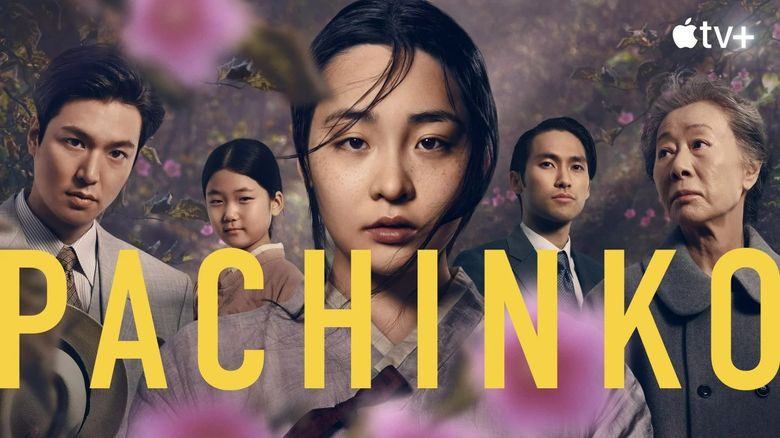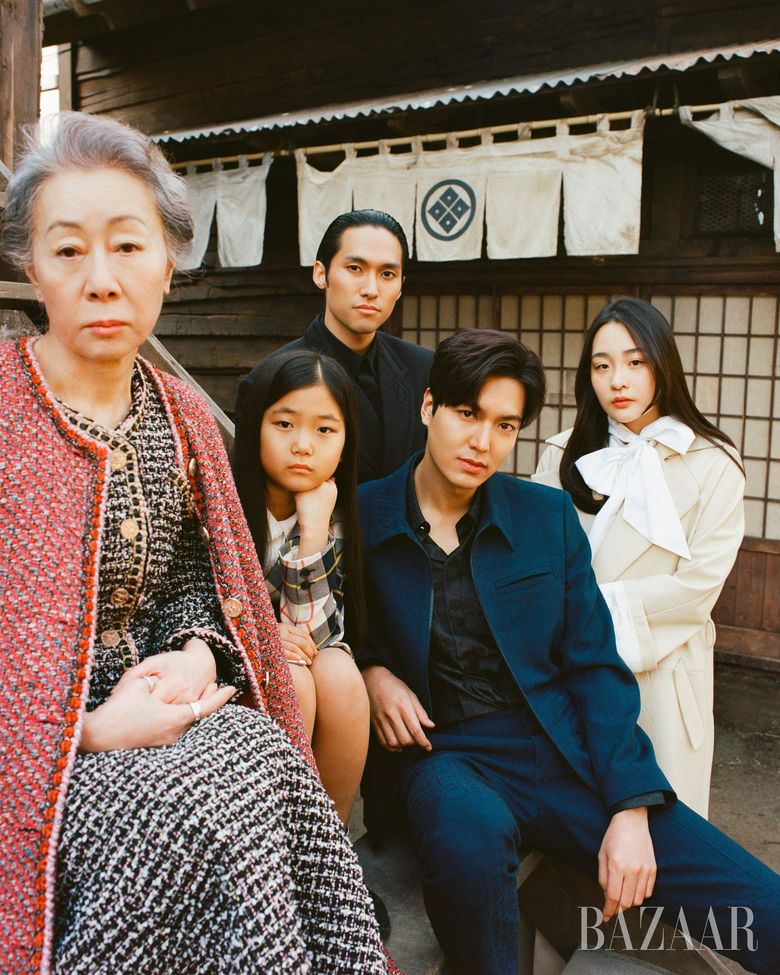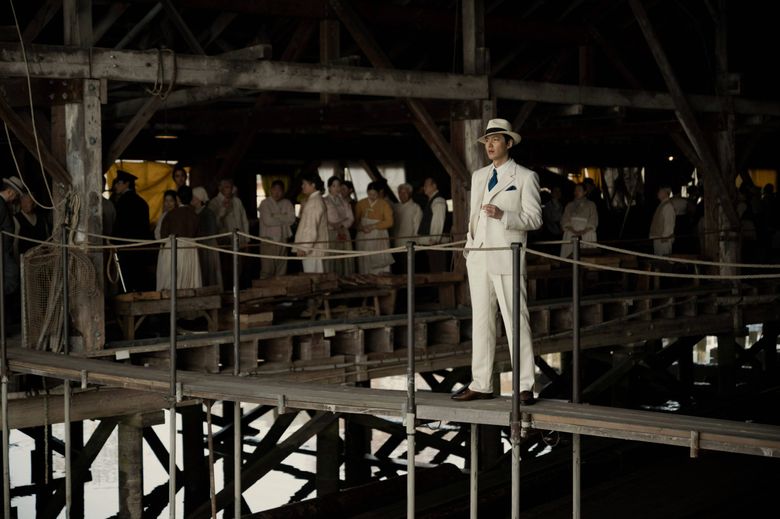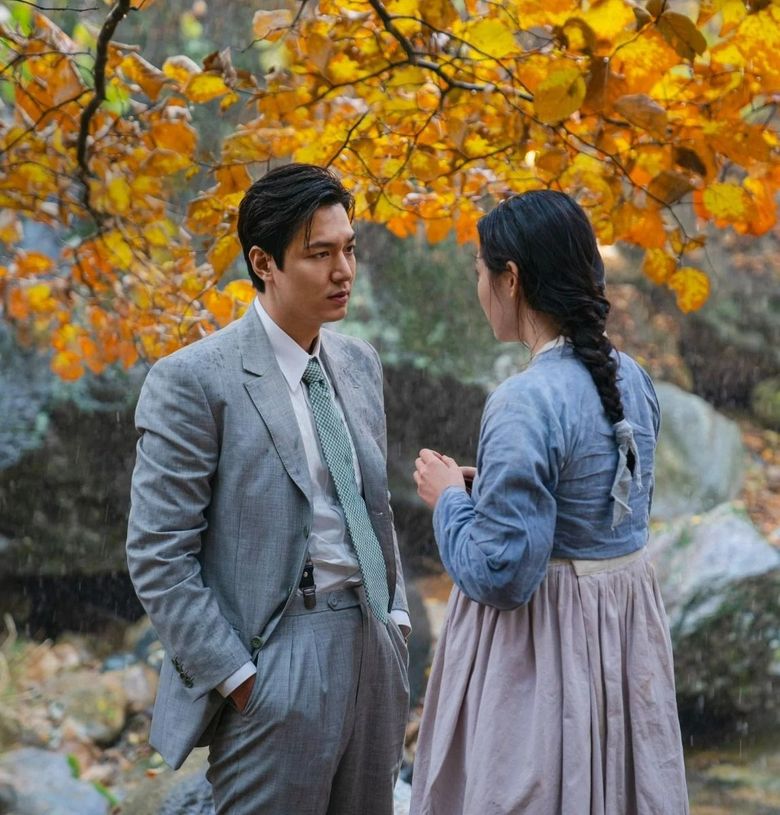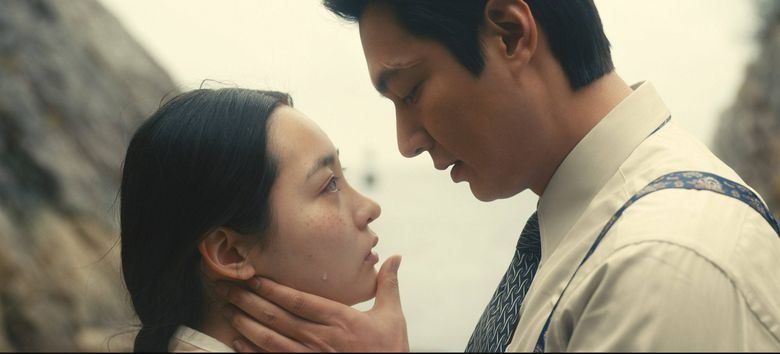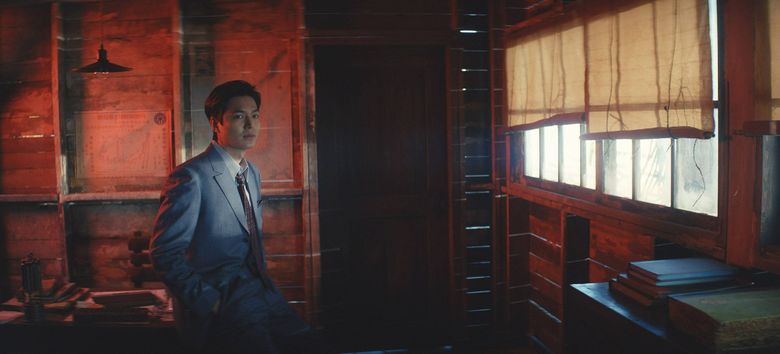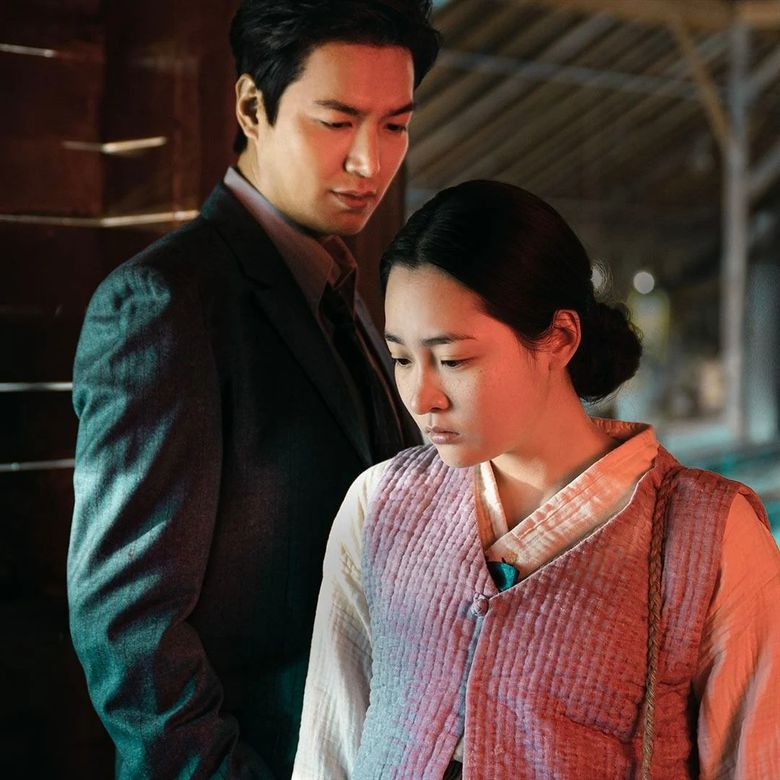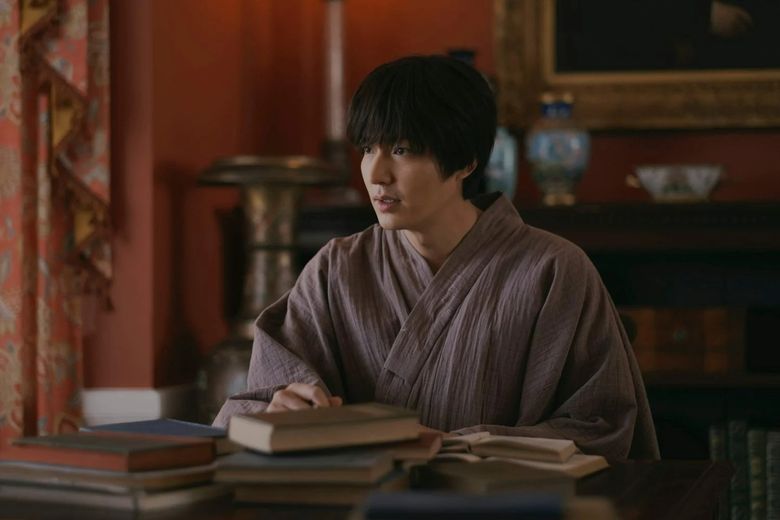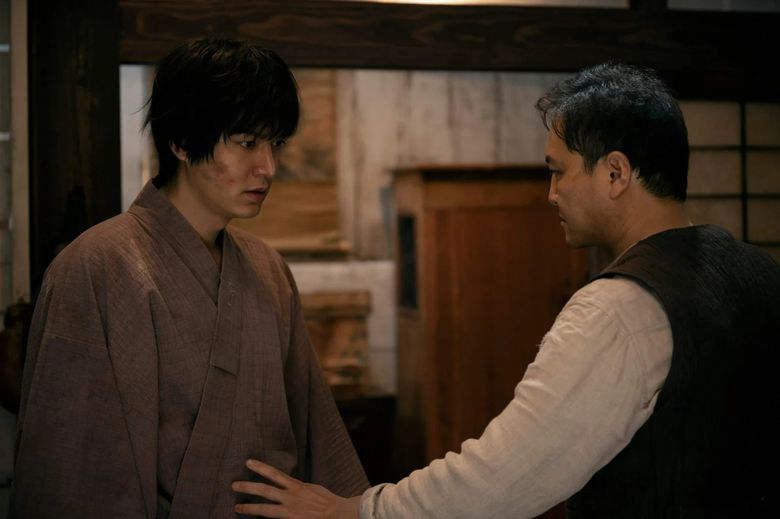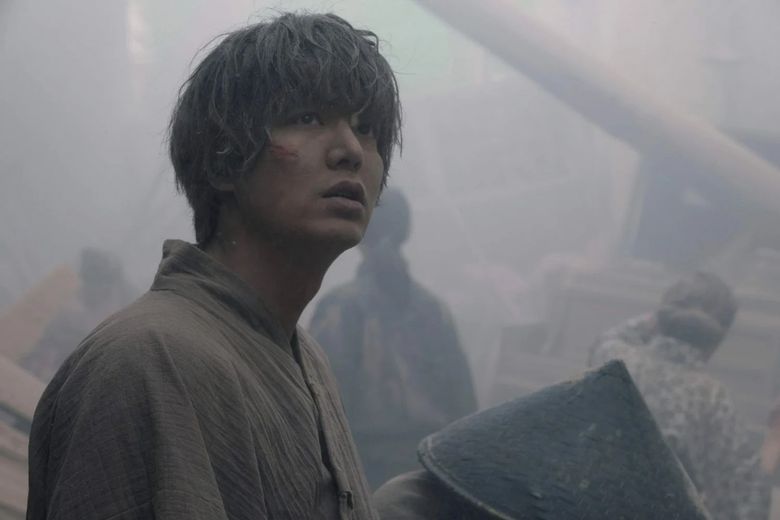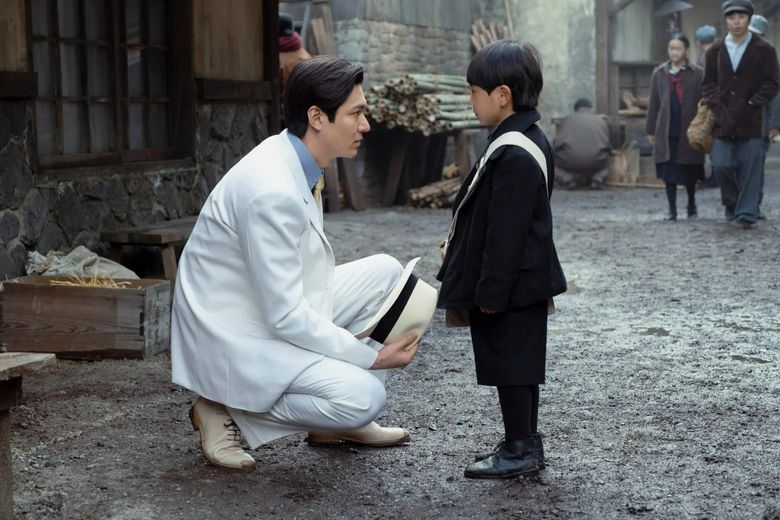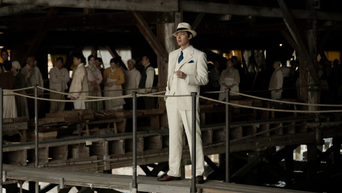Note: This article is based exclusively on the portrayal of Koh HanSu in season 1 of the drama adaptation by Lee MinHo. It will not take into account the complete scope of the character in the original novel. Spoiler Alert!
01. Adapting An Epic: The What, When, How And Why
The remotest idea of a screen adaptation for the international best-selling novel “Pachinko” by Korean American author MinJin Lee was first conceived in an era when “Parasite”, “Minari” and “Squid Game” had not yet opened up the brave new world where stories of the Korean diaspora would be seen or even considered “sellable”. Years later, it has achieved unimaginably grand success, proving to be the first step in chronicling the untold histories of people of colour all over the world. For those who might not know, “Pachinko” is the 2nd novel in MinJin Lee’s diaspora trilogy and a 2017 National Book Award finalist. It is a force to be reckoned with in world literature, especially with how poignantly it creates a channel for generational trauma and imparts a sense of identity and understanding to countless lost souls who can now find repose in Lee’s words. The eight-episode adaptation making up season 1 of the show, gently evokes the life of those pages to translate it with raw authenticity on screen, and it would not have been possible without the incredible cast of actors who imbued the work with richness and meaning. Set during the Japanese occupation of Korea, which lasted from 1910 till the end of World War II,“Pachinko” tells the story of four generations of a family, in 3 languages, hinged on one woman - SunJa, reflecting the macrocosm of the Zainichi (ethnic Koreans living in Japan) people, which is arguably being represented with such panache for the first time in the history of art, especially in the West. From YangJin to SunJa, Mozasu to Solomon, “Pachinko” presents a confrontation, a conversation between the past and the present, whereby the future shifts from being burdened by the past to finding strength in the same. The adaptation is vibrant and pulsating with life but also a bleak portrayal of a past that is both brutal and unfair at large. This binary is further reinforced by the dual timeline narrative structure. Our characters are multi-dimensional and greatly subjective, and yet, there is a universality to their experience that binds the audience to them. They elicit empathy rather than sympathy, and the distinction has never been clearer. The saga they weave, of triumph and tragedy, pain and endurance, sacrifice and recompense, a modern displacement to a romantic return, statelessness to survival, is nothing short of an epic, and “Pachinko” deserves all the appreciation in the world for ambitiously executing this in the most delicate and sublime way possible. As for how this adaptation came into being, creator, showrunner, writer, and executive producer Soo Hugh, joined by directors Kogonada and Justin Chon are the ones we have to thank. Despite innumerable challenges, this dream team pulled through to bring us a masterpiece of historical fiction that will most definitely change the course of Asian representation in the entertainment industry. Author MinJin Lee is said to have been involved initially, but she handed over creative freedom to the showrunners with her well wishes later on. Indeed, the show does exercise a lot of this freedom, inserting more relevant nuances that were otherwise absent in the novel, such as Koh HanSu’s backstory or Baek Isac’s political inclinations, and oscillating within time and space in a dizzying yet tremendously impactful manner, allowing viewers to notice parallels between generations that mirror their own. Similarly, the actors: Jeon YuNa, Kim MinHa, and Oscar-winning icon Youn YuhJung, who play SunJa across three significant phases of her life, Jin Ha as Solomon, Noh SangHyun as Baek Isac, Jung EunChae as Choi KyungHee, the man of the hour, Lee MinHo as Koh HanSu, and many others, delivered performances of remarkable grit and caliber, conjuring catharsis and deliverance that can only be described as monumental. Jeon YuNa and Kim MinHa, who play the young and teenage versions of SunJa respectively, revealed how they infused their characters with the strength of their grandmothers and great-grandmothers in order to truly portray their lived experiences with sincerity. Youn YuhJung, who plays the eldest version of SunJa, shared that even South Koreans could learn a lot about their own history from the show and that her ultimate hope is to honor their story with the same. Lee MinHo, who plays Koh HanSu, shared that he was drawn to the script of “Pachinko” because he felt that it was important to revisit the past and chart the history of the land on which the younger generation now thrives. Most importantly, for Soji Arai, the actor who plays SunJa and Isac’s son Mozasu, Pachinko offered a rare chance to proudly showcase his own Zainichi heritage. Soji Arai’s grandparents relocated to Japan around the same time as SunJa in “Pachinko”, and his parents were activists who fought for reformation against a discriminatory regime. The actor candidly revealed that even today, Japanese narratives rarely include Zainichi characters, and there are few opportunities for artists of Zainichi origin to celebrate their ethnicity, which makes his role as Mozasu in “Pachinko” all the more meaningful. Thus, needless to say, “Pachinko” must be studied for ages to come as the cultural reset that changed the world.
02. The Symbolism In “Pachinko” & How It Manifests In Koh HanSu
The dazzling opening credit scene of “Pachinko” under the brilliant lights of a pachinko parlor lays the foundation of the primary metaphor of the show: mastering an unwinnable game. Pachinko, which gets its name from an onomatopoeia (referring to pachin - the sound that a Pachinko machine makes), is not only one of the most popular games to come out of Japan but also a booming business that has transformed into an industry in its own right. Initially a children’s game, Pachinko is now more akin to adult gambling and surpasses the annual gambling revenue of Las Vegas by an insurmountable margin. The game itself consists of a vertical pinball-style slot machine into which a player must launch metal ball bearings and aim to have them land in winning pockets that will, in turn, reward them with more balls. However, the playfield is crowded with brass pins that act as obstacles on the way. The more balls you earn, the more chances you have to win, and in the end, you either keep playing or hand them in for your earnings. Instead of cashing these balls out, the pachinko parlors exchange them for tokens and tickets that can then be legally turned into cash by third-party establishments. Now, there are two ways to win at a game of Pachinko - skill, and luck. You must know the exact technique of launching the balls into the machine that will improve your chances of triggering a jackpot. At the same time, the unpredictability of the pins affects the result at every turn. In “Pachinko”, we see Mozasu, the owner of a Pachinko business, teaching an apprentice how to tweak the pins and mess around with them so as to turn luck in the house’s favor. So, in essence, Pachinko is a rigged game from the very start, and yet, people play on, with hopes of winning a game that simply cannot be won. Thus, Pachinko is largely regarded as a shadowy enterprise by Japanese people, especially the middle class, who realize the traps but fall into them nonetheless. This morally ambiguous and stigmatic reception of Pachinko among the general public, combined with its ties to the yakuza (Japanese gangsters), is part of the reason why Koreans have a strong foothold in this industry, for it is only acceptable for the “other” to indulge in this business. In this socio-political context, Solomon’s contempt and shame when he hears from SunJa that his father plans to open a second Pachinko parlor and when he is berated by his Japanese friend for being the son of a Pachinko business owner, takes on greater meaning. The characters in “Pachinko” are metaphorized as the ball bearings in a game where all the odds are stacked against them, and they have little to no control over the direction of their lives. Like the pins on the Pachinko machine, forces of history, such as the Japanese annexation of Korea, the 2nd World War, partition, anti-Korean sentiment in Japan, and so on, end up affecting future generations in a sort of ripple effect. Our protagonists are acutely aware of these forces, which are beyond their control, yet just like the opening line of the novel - “history has failed us, but no matter”, they must persevere, lest they end up lost and forgotten like a Pachinko ball that doesn’t make it to a winning pocket. When we first meet Koh HanSu in “Pachinko”, he is an uptight, unyielding new fish broker in the district - stern about his business and unforgiving in nature. Rumours of the blood on his hands follow him, and his grim personality suggests a truth to the matter. He holds nothing but scorn and greed in his eyes, which soften at the sight of SunJa standing unmoved in the face of a Japanese soldier while others bow. Almost immediately, he is taken by her fortitude and is unspeakably attracted to her. This isn’t so much because of her beauty as it is about him seeing a foil in SunJa (more on that later). With his enigmatic charm and worldly knowledge, HanSu bewitches SunJa, who was but a teenage girl at that time. He tells her about his disdain for the motherland and what it represents, urging her to explore the outside world, revealing that he was once poorer than her, but he still had dreams of his own that he fought hard to defend. Their conversations flow from Osaka to America, and the more she gets to know him, the more she is smitten. Their relationship turns physical after a point, which SunJa later refers to with a sense of confusion, not knowing what he wanted or what it all meant. Even as a tear falls down SunJa’s cheek, HanSu looks at her with urgency rather than tenderness, but the audience’s point of view mirrors SunJa’s - we are in love with their love, and the heroine seems to have found her hero who will whisk her away to paradise. However, when she gets pregnant, the illusion shatters. HanSu reveals that he is a married man with 3 daughters, and while he will set SunJa up for a life of luxury, he can never marry her. SunJa processes this speechlessly but HanSu reassures her that his is a marriage of convenience and there’s no love in the relationship. Still, when SunJa remains inflexible, he turns on her, alleging that it was her plan all along to trap HanSu with a pregnancy because no other man will have the daughter of a cripple as a wife. SunJa, who would rather not live a life split in two, walks away, determined to never look back. HanSu, on the other hand, has different plans. When HanSu finds out about SunJa marrying Baek Isac, he warns her of the perils of life in Japan, much in contrast to the rosy image he had painted earlier, but SunJa is set on this new life which Isac has so graciously offered her. Throughout the rest of the narrative. HanSu continues to dip in and out of SunJa’s life, keeping a watchful eye on her and his son, protecting and supporting her in dire times of need, such as when SunJa sells the watch gifted to her by HanSu or when Noa, their son, is left fatherless after the arrest of Isac. Even then, he maintains that SunJa’s situation is a direct result of marrying a man weaker than her, so she must pay dearly. With this introduction of Koh HanSu, portrayed exceptionally by Lee MinHo, down to the minuscule details, the audience is able to position him with respect to where he stands in the game of Pachinko. It becomes clear that Koh HanSu is no longer a Pachinko ball. Instead, he’s the one manipulating the pins, and the reason (not the excuse) for this behavior is wonderfully etched out in the latter half of the series.
03. Staring Into The Abyss: What Drives Koh HanSu?
The first rational conclusion we draw about Koh HanSu is that he is a man of power and means who can turn stone into gold. He is confident, with otherworldly good looks, bold and most of all, feared. This is the kind of man you want to have on your side, especially at the time when “Pachinko” is set, but also someone you do not want to mess with. This mysterious aura enamors SunJa, who is around 16 years old, and the two begin an illicit affair. This begs the question: for a man as influential as HanSu, what drew him to SunJa? Let’s try to answer that question. Originally, the scene where SunJa doesn’t bow to the Japanese soldiers is absent in the novel. In the drama adaptation, that one willful, self-affirming move, is seen as the defining force that pulls HanSu in. He isn’t just a love interest thrown in for the plot or a trope to further SunJa’s character development. Instead, HanSu’s attraction to SunJa has dimension. SunJa represents untainted innocence, courage, and resilience in the face of hostility - all things that HanSu has abandoned in favor of survival. In one particularly affective scene, when HanSu is accompanying SunJa while she does the laundry, she asks him why he is back in Korea if it’s so much better out there in the world. HanSu replies, saying that when he left, he was empty-handed, so he wanted to return now that he was affluent to see if his shadow would still be here, adding that he must have been kidding himself. However, HanSu does find his shadow - in the form of SunJa, which amplifies his desire to “have” her. What HanSu feels for SunJa might not be the same love that Isac feels for her, but it is certainly a different breed. It would be a disservice to label it as lust, romantic or platonic love. Instead, it is a deep longing for the past, for a prelapsarian innocence that HanSu will never get back, and that is why it runs so deep. His passion is rushed because it cannot possibly be reciprocated, and understanding that is key to deciphering HanSu. This is not to say that HanSu’s actions aren’t immoral or cruel even, but the show maintains him in a neutral light to offer a shift in perspective, of life as it was under Japanese rule, and the innumerable ways of coping that people found - none of which can be villainized on a core level. HanSu knows, perhaps better than anyone else, what life for SunJa will be like once she marries Isac and moves to Osaka with little to no resources but she is young, bright-eyed, and too full of vitality to give in to realism. He intimidates her in order to deter her from leaving, but his language carries a tinge of affection. He has met Isac before and measured his temperament - he’s too soft and idealistic to survive the ill-will of the oppressors, which means that SunJa will once again have to shoulder the burden of endurance. Afraid that she might turn into another version of him, HanSu is firm in his disapproval, going as far as claiming that Isac only married SunJa because no other woman will have him. SunJa, at this point, may not be in love with Isac, but she feels a devotion towards the man she considers her savior, so HanSu’s words only stab like needles in her back. He reasons with her, arguing that he offered her much more than Isac ever could but to SunJa, what matters is not material wealth but emotional stability. She chooses poverty over shame and renounces HanSu for the sickening life he leads. A closer look into the gaze Lee MinHo holds at this moment betrays HanSu’s helplessness like sand through his fingers. His throat is going dry, he needs to gulp his pain down, and refrain from expressing his inner torment, lest he breaks free from the shackles that both hold him back and hold him together. He resorts to the same charisma that won SunJa over the first time, in a final, desperate attempt to keep her to himself, reminding SunJa of their ardent affair, but his next words “don’t go” are barely a whisper and more sincere than anything he has said before this. As if deliberately presenting himself as a formidable figure, HanSu throws in his last card - the child in SunJa’s womb. It backfires, strengthening SunJa’s resolve, which triggers a violent reaction from HanSu. However, as SunJa walks away once again, the faintest crimson light hits HanSu’s face, showing us a glimmer of tears welling up in his eyes, washed in regret and defeat. Lee MinHo is so spectacular in this pivotal scene, from the emotional vacillation he portrays to the aching delivery of his dialogues, coercively holding on and wistfully letting go, albeit with a threat that is evidently all too false, that it sends shivers down our spines. After all, there’s a reason why this man is the face of Hallyu, and this scene is proof of his mettle. The next time we see HanSu, it’s in Osaka, where he continues to watch over SunJa without apparent interference, contrary to the menacing ultimatum he gave her about forgetting her name even if she begs for help. Unbeknownst to SunJa, his presence is constant in her life, and in many ways, selfless. What drives HanSu is the inexplicable urge to “save” SunJa and her family as if he is living vicariously through her. What HanSu doesn’t realize, at least not in totality, is that SunJa saves herself at every single turn of her life, and there is nothing more potent than her instinct to persist.
04. The Tragedy That Birthed An Anti-Hero: The 1923 Great Kantō Earthquake & Disaster Discourse
Episode 7 of “Pachinko” does away with the classic opening credit in favor of a more minimalistic and somber introduction to what is arguably the most politically charged original addition to the novel - Koh HanSu’s backstory. With this exposition appearing in the penultimate episode, the audience hardly has time to rationalize his behavior in the previous chapters but still comprehends the man that he is. This episode draws from the experience of the horrific 1923 Great Kantō Earthquake that ravaged the city of Yokohama, Japan, and the massacre of innocent scapegoated Koreans that followed at the hands of Japanese vigilantes. In reality, the Great Kantō Earthquake of September 1, 1923, had a magnitude of 7.9 and was accompanied by fires and aftershocks that destroyed the structure of the nation. It left millions of people homeless and claimed over 110,000 lives. In the words of moral philosopher Shimamoto Ainosuke, it had “overturned Japan’s culture from its very foundation”, fostering what J. Charles Schencking calls a “culture of catastrophe” that re-shaped much of the socio-political and ideological framework of Japan. HanSu is a fictional survivor of this disaster, and this is the event that changes him forever as he witnesses the mercilessness of history and learns what it means to survive. Actor Lee MinHo studied the 1985 Russian film “Come and See”, to draw out his own authentic emotions for this episode, and it is no surprise that he delivers brilliance unlike anything we’ve ever seen before. This episode is a testament to Lee MinHo’s sheer acting prowess, and we bow to his greatness. No one, if not him, would have been able to eke out the nuances of HanSu’s transformation with such sublime transcendence. It is also important to note that this is the only episode with a different aspect ratio, meant to capture a portrait of Koh HanSu while also reflecting the cinematic style of the 1920s - a genius creative decision by the “Pachinko” team. We meet a young Koh HanSu, dressed in a traditional Japanese kimono that is still withstanding wear and tear. HanSu revealed in an earlier conversation with SunJa that he and his father had one set of clothes each that they washed every night and put on again in the morning, usually while it was still damp. There was a fondness in HanSu’s voice while he told the story, even though it was inherently one of lack, and when we meet this younger version of HanSu, the reason becomes clear. HanSu lives with his father, who works as an accountant for the yakuza boss Ryoichi (played by Takashi Yamaguchi), and he himself is a math tutor for a wealthy American family, the Holmeses, who would like to take HanSu to America with them. So, when Ryoichi offers a job to HanSu, his father refuses on his behalf so that he may escape the clutches of crime. Ryoichi heeds their decision but doesn’t leave without a word of caution. He reminds HanSu that while his Japanese has improved a lot, he will have to work harder to become one of them - a theme that resonates throughout the story via our protagonists. Still, HanSu’s father urges him to follow the Holmes family and go live the life that his father could not give him. HanSu, however, would much rather live with his father, despite his inner desire to escape. To pacify him, HanSu’s father uses the metaphor of stars in the sky, which appear to be close together even when they’re light years apart, and this imagery turns up at a crucial point later on. HanSu’s relationship with his father is debatably the only love he has ever experienced in his life, and it shapes him as a person. This HanSu is clumsy, simple-minded, and naive but also highly intelligent and capable. There’s an air of fragility to his doe-eyed demeanor, which is complemented perfectly by his American dream. Lee MinHo expresses this binary with such a nuanced purity that it is virtually impossible to believe that this is the same man who breaks SunJa’s heart. With the support of the Holmes family, HanSu has his life mapped out in front of him. However, things come to a head when his father is caught stealing from Ryoichi to provide for a woman he has fallen in love with. HanSu questions this out-of-character behavior on his father’s part, who simply tells him that when he too falls in love with a woman and loses himself, he will understand his father’s plight - a harkening back to HanSu’s relationship with SunJa. Seeing that his father is unable to pay his debt off, HanSu offers to ask Mr. Holmes for the money, but it is not an option that his father would allow, in case that ruins HanSu’s chances of going to America. Soon, the two get into a physical altercation, with HanSu’s father pleading with him to kill him in his heart so that he may live for himself. This fight gives HanSu the scar that we see from the very first episode, serving as a reminder of love and loss. They return to Ryoichi empty-handed, and HanSu volunteers to work for him until the debt is written off. However, his father protests, desperate to shield HanSu from the underworld, saying that he would rather die than jeopardize his prospects. Ryoichi looks down on them in contemplation, but his silence is disturbed by the Earth opening up, in what is now called the Great Kantō Earthquake. Chaos ensues, and HanSu’s father passes away while trying to protect him. The scenes that follow depict the onsetting of trauma through the best performance of Lee MinHo’s illustrious career, and that is saying something, considering that he is one of the finest actors to have ever come out of the Korean entertainment industry. HanSu screams in pain, but it is dampened by the silence deafening his ears until he is found by Ryoichi, who tells him to snap out of it and move to higher ground. They survive, and Ryoichi advises him to chase the dream his father sacrificed his life for. He tries to reach the Holmes family and escort them to safety, but the aftershocks of the earthquake take their lives. Later, when HanSu finds their bodies, he reaches for a pocket watch and keeps it. This is the same watch that he gifts SunJa, and this tragic background suddenly transforms the meaning of that gift. That watch was an integral icon of HanSu’s past, and he hands it over to SunJa, further reinforcing the importance of their relationship to him. Another significant symbol appears in the final interaction between Mrs. Holmes and HanSu in the form of some pearl necklaces that she hangs around HanSu’s neck, evoking the proverb - “a pearl necklace on a pig’s neck”, meaning that one must live within one’s means. HanSu’s dreams are shattered, and he chooses the only alternative he can see in front of him - Ryoichi. That night, while Yokohama is up in flames, Ryoichi and HanSu encounter rumors circulating about Koreans who have escaped prison and are attacking the Japanese. Ryoichi, in the presence of HanSu, attempts to shut down such racist speculation and decides that they must leave for a safer environment. On the way, they meet an old man who is trying to direct four Koreans to a nearby barn so that they may hide from the Japanese vigilantes. HanSu steps forward to translate, but the sight of some Japanese people nearby means that he must hide too. He gets into the older man’s cart, who is now being interrogated by the Japanese punishers as to the whereabouts of the Koreans. He tries to misguide them, but the barn is too obvious of a distraction. Without a second thought, they set the barn on fire while HanSu watches from a gap in the slats as his people scream in horror. It distresses HanSu to such a degree that he has a visceral reaction to it, shaking and crying out in pain. Ryoichi realizes that it would be impossible to subdue him, so he hurries to leave the premise with HanSu. The night draws on, eventually reuniting Ryoichi with his family, who declares that they will be taking care of HanSu for the time being because he has his father’s debt to repay. While this proclamation can be interpreted in a number of ways, such as an act of kindness or the oppressor’s ploy, I choose to see this, in the scope of the first season alone, as a consolation to HanSu, who will probably feel less small if he is taken in for what he owes rather than out of pity. The survivors lay down to get some rest, and an ostensible peace returns. Dawn rolls around, and HanSu lies awake, staring up at the sky to see the stars, so close yet so far, recalling the metaphor his father once taught him. Yet, the distance between them is no longer created by dreams. Instead, it is a reminder of everything he has lost, never to return. It doesn’t comfort him but rather, riles him up. He gets up, and as soot and dust cover the city of Yokohoma, HanSu looks out into the horizon, examining the devastation left in the wake of the Great Kantō Earthquake. At that moment, something inside him shifts, almost as if the old HanSu is making space for a new one - one who has been touched by death, maligned by it. His transformation is birthed in the eyes and evinced in the tightness of his jaw, the quiver of his lips, and the vengeance in his breath. This is the Koh HanSu we meet in the first episode, and that Noa meets in the 8th - failed by the world, burdened by survival. The massacre of the Koreans at the hands of the Japanese following the Great Kanto Earthquake was something that has rarely found representation in film or television, so to add this as Koh HanSu’s tragic subplot not only serves to humanize HanSu but also gives voice to an untold story, which was much more ruthless in real life. Koh HanSu’s final appearance in “Pachinko” comes with him meeting his son at a point in his life when he is both vulnerable and in need of a father figure. Before this encounter, we have seen Noa expressing a certain discontentment with his parents, a resentment for being left out when they coddled Mozasu. So, when he meets his biological father, albeit with no knowledge of the fact, he absorbs his advice like a sponge. HanSu asks him why he is taking the long way to school when there is a shortcut and adds that in his childhood, going to school was a privilege he could not afford, so Noa should not sulk about it. Noa asks him how he knows where his school is, to which HanSu replies by saying that knowing things is what protects him from the world and that Noa should keep that in mind too. At first, Noa is cautious but tells him that he takes the long way to school because his father enjoys listening to the old lady with a piano on the road, a hint of Isac’s idealism. Noa trails off as he speaks of his father with a pitiful melancholy, which HanSu catches at once, seeing himself in his son. He tells him about the Great Kantō Earthquake and how it left him all alone in a world that he no longer recognized. It is there that he realized that survival isn’t everything; that he must be better than everyone around him - both the Koreans and the Japanese, neither of whom have treated him with respect (a common predicament for the Zainichi). Having learned from his lived experience, HanSu gives Noa the same advice - that he must be undeniably competent to command respect, even if that means being hated by his community. This is how HanSu made his way in the world, and that’s how Noa is going to have to live as well. He concludes with a final direction: that he must never look back, just like HanSu and SunJa never did. With a token of his everlasting support, a handkerchief, HanSu takes his leave, reminding Noa to take the shortcut from then on and not live like a fool because wishful thinking will never get him anywhere in life. As Noa walks away and hears HanSu call his name from behind him, Noa keeps his eyes forward, applying what he has just learned, determined to rise to the top. Elsewhere in the series, we find out that Noa has passed away in the present timeline, and SunJa takes the blame for having “ruined him”. While there’s not much we can infer from this information without referring to the novel, it wouldn’t be an exaggeration to say that Noa’s conversation with his father, changed the trajectory of his life forever, setting a Pachinko machine in motion that will echo the past for ages to come. What did you think about Koh HanSu in “Pachinko”? Share your thoughts with Kpopmap in the comments section down below!
Indian MINOZ Donate To Charity In Celebration Of Lee MinHo’s “Pachinko” KDRAMA STORIES|Mar 24, 2022 Lee MinHo Elaborates On What Draws Him To His Characters As An Actor In His Thirties KDRAMA STORIES|Aug 24, 2021


